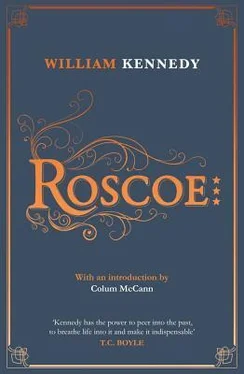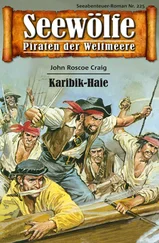Forget it. Roscoe would come alone. Cress had been a lovable sister, but grew into a dotty spinster with selectively skewed memories: all the celebratory minutiae of Felix’s history as mayor, but not a whit of recollection of his removal from office, and no acknowledgment that he had lived half his later life in hotel exile from the family. It was not seemly to have such memories.
Mayor Alex, the fire chief, half the city government, police chiefs from other cities, and a hundred friends circled the grave for O.B.’s ceremonial descent to the eighth floor, no more worry about Albany’s evildoers. No evil down there, either; only pain. Get ready for the boiling pitch, brother barrator, and I may be along presently. Look among the trees for Elisha when you get down there and tell him I’m on the verge of decoding his scheme. But he’s probably elsewhere, you don’t know where in hell to look for that man. And tell him I’ve decided the windshield head-bump injured his prefrontal cortex, which brought on all that anxiety and chloral hydrate, my fault. I hit the brakes, another oblique homicide. Send my regrets.
Monsignor Tooher from St. Joseph’s gave O.B. a full Jesus sendoff, and Roscoe came close to weeping when he remembered the adolescent O.B., for, since Felix was usually on family leave, Roscoe half-raised his brother in those years, Rozzie and Ozzie inseparable: trapping yellow birds with George Quinn, running on top of freight cars; O.B., learning the hard way, fell and broke his arm. Roscoe taught him about Patsy’s chickens and Eli’s horses, took him to the burlesque at the Gayety to see Millie DeLeon shake herself and throw her garters to the audience; also introduced him to a community of reluctant virgins who tested their own limits with Roscoe and then with O.B., who became an apt student of their restraint. To civilize him, Roscoe took him regularly to Harmanus Bleecker Hall to see Chauncey Olcott, Lew Docksteader’s minstrels, Lillian Russell, the Barrymores, even a Shakespeare, was it Twelfth Night ? But the theater never penetrated O.B.’s brain. He had no use for abstract or imposed pleasure, unless it was a woman sitting on his lap. He lived for women, God bless them every one. He also kept on rolling beer kegs for Felix until the brewery closed, then signed on as Patsy’s beer protector. From the McCall brothers he learned truculence as a survival trait; learned so well that Roscoe talked Patsy into letting him exercise it on the force so he wouldn’t turn into a hoodlum. And then O.B. rose, and fell. The newspapers thought they loved him: “Farewell to the Doctor, Who Kept Gangsters out of Albany.” They know about Jack: the sotto-voce legacy that’s now his epitaph. And there you go, O.B., never a bad brother, just a remote one: Roz and Oz, fraternal strangers after adolescence. But he was a blood presence, and now isn’t. First Roscoe without Elisha, now without O.B., a pair without whom Roscoe would be somebody else. He looks into the grave as he gives O.B. the okay to move on, and he knows another small lobe of his soul is atrophying.
“We should talk,” Alex said to him as they walked away from the grave. Roscoe saw Veronica in the moving crowd and returned her nod.
“Now?” he said to Alex.
“As soon as possible, privately.”
Roscoe gestured toward a slope with more illustrious obelisks and statues of angels. “No eavesdroppers up there,” he said.
“Fine.” Alex gestured for Roscoe to lead the way up the grassy incline.
Roscoe and Alex (2)
“I worry about you,” Alex said, a marble cherub hovering behind him. He stood tall, sharp in his black tie on gray collar, getting his old weight back. “This is almost too much to bear. Witnessing it, arranging it yourself. God, Roscoe, I’m so sorry. I wanted to say this at the wake.”
Weary Roscoe sat on the marble sarcophagus of Ebel Campion, the North End undertaker, a good fellow. Ebel would not consider the sitting an imposition. Probably glad for the visit. And Roscoe said to Alex, “It’s good of you, my boy. I’m in a bad place. O.B. was a decent brother, a foolish man. I’m trying to understand him.”
“I’m trying to understand you, ” Alex said. “You’re central to every disaster — my father, the Patsy-Bindy thing, beating up editors, the Notchery scandal, the Dutchman and that murderous whore, now poor O.B. and mad Mac. What’s next for you, Roscoe, wholesaling opium? White slavery? I wouldn’t sell you an insurance policy. You’re a bad risk.”
“I do seem to ride the lightning,” Roscoe said.
“I worry. I worry about Gilby’s case. These are not good omens.”
Ah yes, Gilby’s case.
“It’s two days away. The judge may decide you’re a villain yourself, to be such a friend to villainy.”
“Only a judicial villain could make such a ruling, and we have none so injudicious in Albany.”
“Are you ready for Marcus Gorman? He’s a great trickster.”
“God and natural motherhood are on his side. We can’t lose.”
“I don’t think I follow.”
“Righteousness doesn’t stand a chance against the imagination, Alex.”
“I’d like to believe that. But if Mother loses Gilby, she’ll fall apart.”
“I won’t let that happen.”
“That goddamned cunt.”
“The expressive word. I tell you, Alex, Roscoe is ready for whatever she offers, and you’ll see that not only is he capable of change, Roscoe is capable of changing the world. I am a lonely man, but I am a crowd. I grow old. But ancient salt is the best packing.”
“You talk riddles.”
“The poetry of the giants, my boy. You see before you a transfiguration, a man so chastened by experience that he has shunted all his old faults into the brotherly grave. He is awash in mortification. He’s bought several new hair shirts, and he may even go to church.”
“Don’t go too far, old fellow. Lightning may light the church.”
“A new day is rising up from the fresh earth, and a new Roscoe stands astride it.”
“You sound like an old lush taking the pledge,” said Alex.
“Your tongue has a talent for brutish truth.”
“Isn’t all truth brutish?”
“I wouldn’t know,” said Roscoe. “I rarely encounter any.”
Isn’t It Romantic?
As Roscoe walked down the cemetery slope he decided that derision is not healthy behavior, a defense mechanism, really, and that he must get Alex beyond this attitude. A sour mouth is not becoming in a candidate. Also, Alex evoked Pamela, and, against Roscoe’s will, there she is in memory at the Ten Eyck, why? And there’s Elisha with her, and Veronica, ah, now he sees the day clearly, Patsy is at a peak, O.B. and Mac are ten months past Diamond, Alex the youth is spectating, and Jimmy Walker, Al Smith, and FDR are in crisis. Thirteen years gone, but it’s yesterday, and Roscoe must have his reasons for this.
It’s Tuesday afternoon, October 4,1932, the day Elisha, the reluctant gladiator, is on the road to glory. Pamela is striding into Elisha’s busy headquarters on the second floor of the Ten Eyck, just off the train, right out of Vogue in her maroon silk Schiaparelli dress with the emphatic bustline, complaining the front desk won’t give her a room. Roscoe, no longer regretting he ever knew Pamela, now thinking of her as his principal mentor in lousy love, explains that all twenty-five hundred rooms in the town’s ten main hotels have been overbooked for a month; the Trojan, the night boat that brought five hundred Tammanyites up from New York for the Democratic state convention, is a floating hotel this weekend; the New York Central is renting berths in Pullman cars on sidings; and even Al Smith had no room until Tammany boss John Curry dispossessed a delegate to give Al a bed in the DeWitt Clinton Hotel, headquarters for both Tammany and John McCooey’s Brooklyn organization, Tammany’s Siamese twin.
Читать дальше












